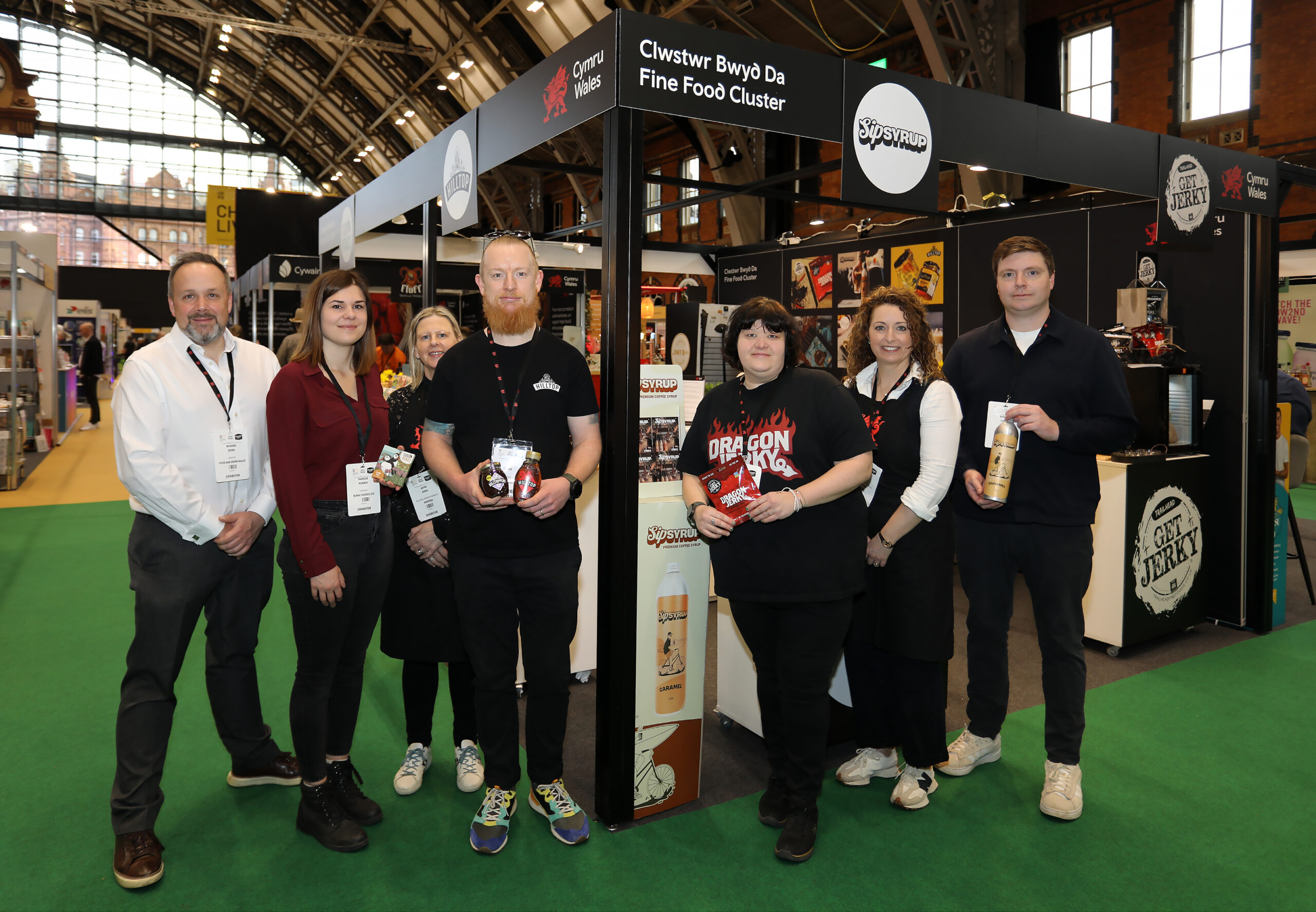
Sioned’s Blog: Growing Together – How Welsh Food Clusters are Cultivating Success
Growing Together: How Welsh Food Clusters are Cultivating Success
What if the secret ingredient to business success wasn’t just a great product, but powerful collaboration?
Wales is famous for its stunning landscapes and, increasingly, for its incredible food and drink. But incredible food doesn’t just happen; behind the scenes lies a secret ingredient for growth and innovation: collaborative groups called Clusters and their focused Special Interest Groups (SIGs).
Funded by the Welsh Government and run by business development agency Mentera, these groups bring together businesses, knowledge, and opportunities, helping the Welsh food and drink sector reach new heights. Three clusters are already making a real difference: the Food & Drink Wales Fine Food Cluster, the Honey Cluster, and the Seafood Cluster.
Imagine a space where businesses facing similar challenges can chat, share ideas, and find solutions together. That's exactly what these clusters are all about! They’re like hubs, encouraging teamwork over competition to help overcome obstacles that individual businesses might struggle with alone.
The Food & Drink Wales Fine Food Cluster: Growing bigger and better
For producers of high-quality food and drink looking to expand, the Fine Food Cluster provides a vital platform. It actively identifies and solves common problems, connecting producers with commercial, governmental, and academic partners to create a powerful environment for development.
With a dedicated cluster manager, businesses gain access to the "know-how" they need to tackle challenges and grab new opportunities. The main goal is to build knowledge, encourage innovation through partnerships, and ultimately achieve lasting growth through activities like peer-to-peer support, events, and joint business activities.
The Food & Drink Wales Honey Cluster: A Sweet Success Story
Wales has a rich beekeeping history and produces amazing honey. The Welsh Honey Cluster is dedicated to making the most of this potential by bringing together honey producers who share a common goal: to champion Welsh honey and related products. This cluster understands the power of a unified front, allowing micro and medium-sized businesses to team up on innovative projects that accelerate their growth.
The aims are clear: increase sales of Welsh honey and other food products, build a strong professional brand, explore new markets under this unified banner, and ultimately create profit and jobs within the Welsh honey sector. Regular meetings across Wales, led by the members themselves, ensure the cluster stays relevant and impactful. Dedicated sub-groups, supported by a Cluster Leader, work on achieving these aims between meetings. This gives honey producers invaluable access to information, guidance, and a strong support network to navigate the industry and achieve lasting growth by collaborating with trade, academia, and the wider food chain. It also opens doors to market briefings, workshops, and trade exhibitions.
[caption id="attachment_6169" align="aligncenter" width="1024"]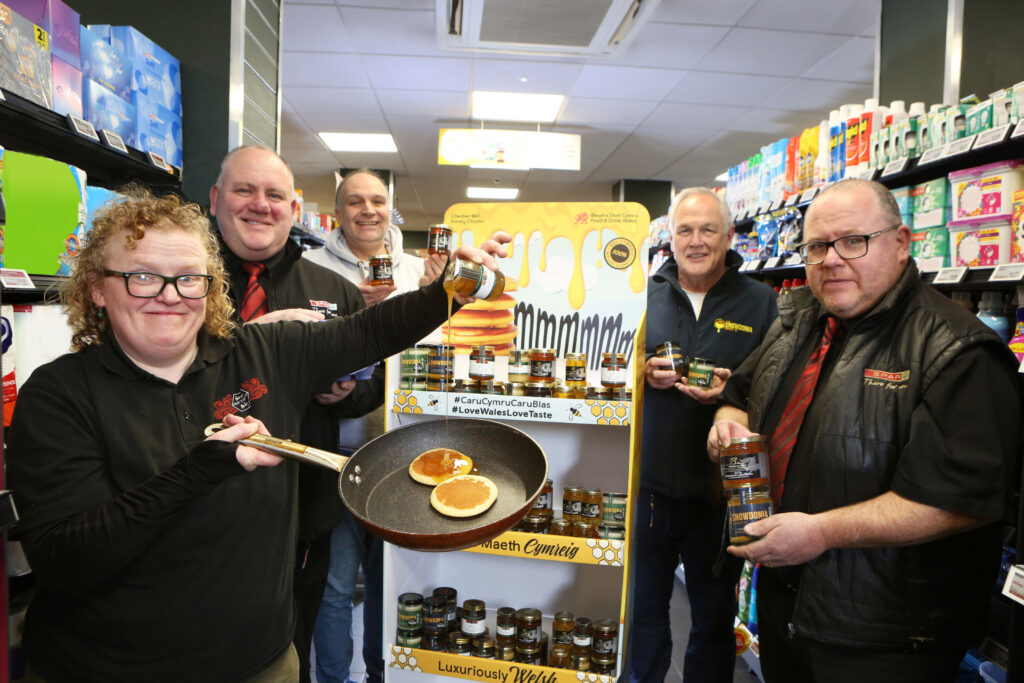 L-R: Carys Edwards, Mel Pen-y-Bryn Honey, Ganllwyd; Phil Griffiths, Spar General Manager; Shane Llewelyn-Jones, Bee Welsh Honey, Builth Wells; Alun Allcock, Snowdonia Honey Co, Caeathro and Richard Griffiths, Spar Llanrwst store manager.[/caption]
L-R: Carys Edwards, Mel Pen-y-Bryn Honey, Ganllwyd; Phil Griffiths, Spar General Manager; Shane Llewelyn-Jones, Bee Welsh Honey, Builth Wells; Alun Allcock, Snowdonia Honey Co, Caeathro and Richard Griffiths, Spar Llanrwst store manager.[/caption]
The Food & Drink Wales Seafood Cluster: Adding Value from Welsh Shores
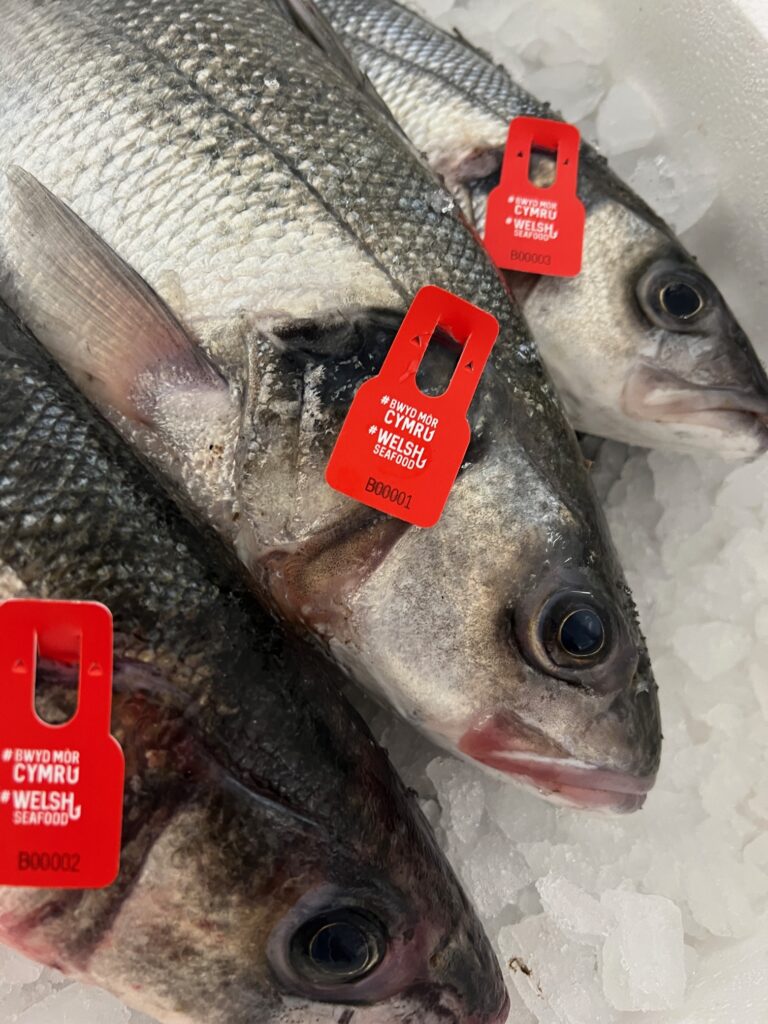
Wales’ coastline offers a wealth of fantastic seafood. The Welsh Seafood Cluster focuses on bringing together fishermen, fishmongers, processors and aquaculture businesses who all want to grow by adding value to the fish and shellfish caught or farmed on Welsh shores.
Committed to helping businesses overcome growth barriers through collaboration, the Seafood Cluster provides support and "know-how," empowering businesses to develop their knowledge and work together on projects addressing crucial areas like "Women in Fisheries," packaging innovations, Responsible Fishing Scheme (RFS) initiatives, and shellfish development. With a dedicated cluster manager and a framework for innovation involving academic institutions, companies, and government, the Seafood Cluster helps improve knowledge, understanding of business opportunities, and ultimately, lasting growth through activities like peer-to-peer support and joint commercial activities.
Special Interest Groups (SIG’s) - Targeted Support for Diverse Needs
Within all of these clusters, businesses facing similar challenges or pursuing specific opportunities can connect and collaborate on an even more detailed level through Special Interest Groups (SIGs). These groups allow for targeted action and knowledge sharing, boosting the benefits of the larger network.
The Food and Drink Wales Fine Food Cluster has several active SIGs designed to meet the specific needs and goals of its members:
- Dairy SIG: Recognising how important milk is in many fine food products, this group provides a space for members who use cow, ewe, or goat milk to discuss sector-specific concerns and challenges. This leads to tailored solutions and shared best practices within this particular dairy processing area.
- Destination Groups (North West & South West): These proactive SIGs show the power of working together to enter new markets. By focusing on key areas in the North West and South West of England, members pool their resources and knowledge to collectively approach independent retailers like farm shops and delis. They also organise impactful "meet the maker" events and in-store sampling initiatives as a united front.
- Ingredient Buying Groups (Butter & Sugar, with future expansion): Recognising how much ingredient costs can impact profits, these SIGs help businesses buy ingredients together. By collaborating on contacts, logistics, distribution, and storage, members aim to get better prices for essential ingredients like butter and sugar. There are plans for these to merge into a broader "ingredient buying group", potentially including cream, chocolate, and other ingredients to maximise savings.
The Welsh Seafood Cluster is particularly active with its Special Interest Groups, showing a real dedication to meeting specific needs and driving innovation within the fisheries sector:
- Women in Welsh Fisheries: This inspiring SIG brings together like-minded women working across the Welsh seafood industry. By challenging stereotypes and building connections, it empowers women within the sector, helping them access new opportunities and promoting their independence through collaboration with wider UK Women in Fisheries groups.
- Seaweed - Establishment of a Welsh Seaweed Network: Recognising the huge potential of seaweed, this SIG focuses on sharing knowledge and actively learning from established seaweed farms in Europe and America. The aim is to create marketable seaweed-based products while promoting the sustainability and restorative benefits of seaweed farming through the creation of a Welsh Seaweed Network, which aims to increase innovative seaweed products from Wales.
- Lobster Banding and Bass Tagging: This innovative SIG, promoting "#WelshSeafood", focuses on adding value and transparency to responsibly caught seafood. By tagging sea bass with unique numbers and banding lobsters, which can be traced on a website, consumers can see where their fresh seafood comes from. This also provides information about its origin and highlights a commitment to the Welsh fishing industry, building trust and showcasing quality. Initial feedback from these schemes suggests they can add value to the catch, leading to better prices.
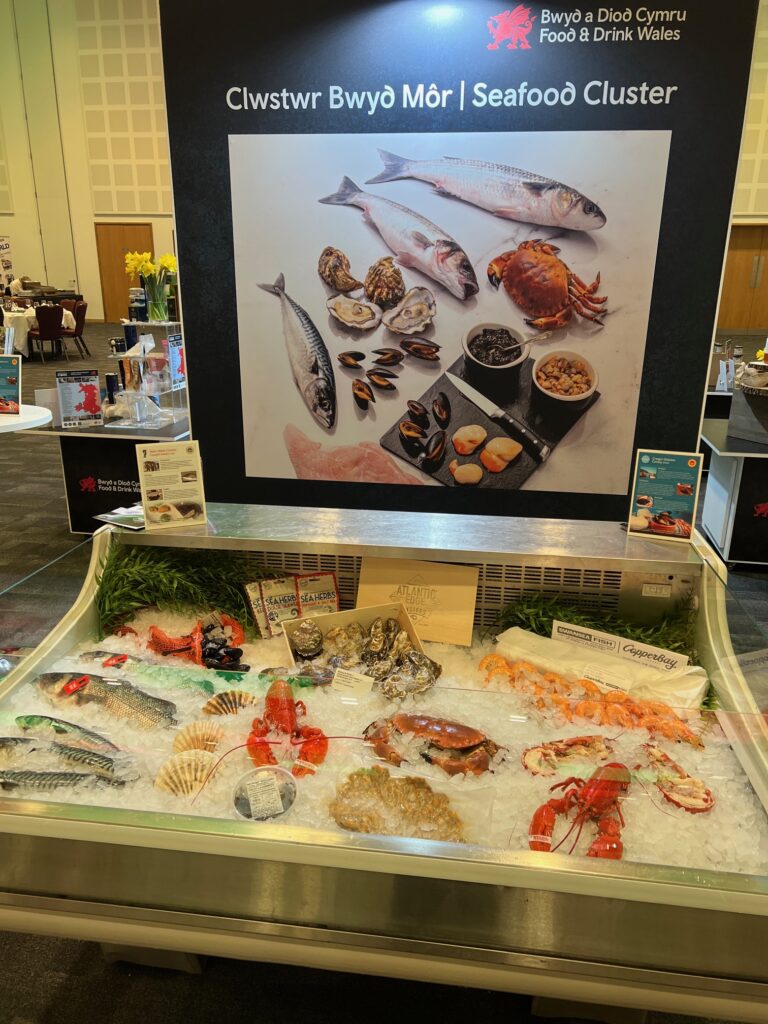
Powering Success Through Focused Collaboration
These Special Interest Groups, particularly within the vibrant Seafood Cluster, show a smart way to boost growth in the Welsh food and drink sector. By creating smaller, more focused communities within the larger clusters, members can tackle specific challenges, pursue targeted opportunities, and use their combined power for greater impact. This layered approach, combining the broad support of the clusters with the focused action of SIGs, creates a dynamic and effective environment for achieving success and ensuring a bright future for Welsh food and drink. The initiatives within the Seafood Cluster really highlight how diverse and forward-thinking these collaborative efforts are.
A Brighter Future Through Collaboration
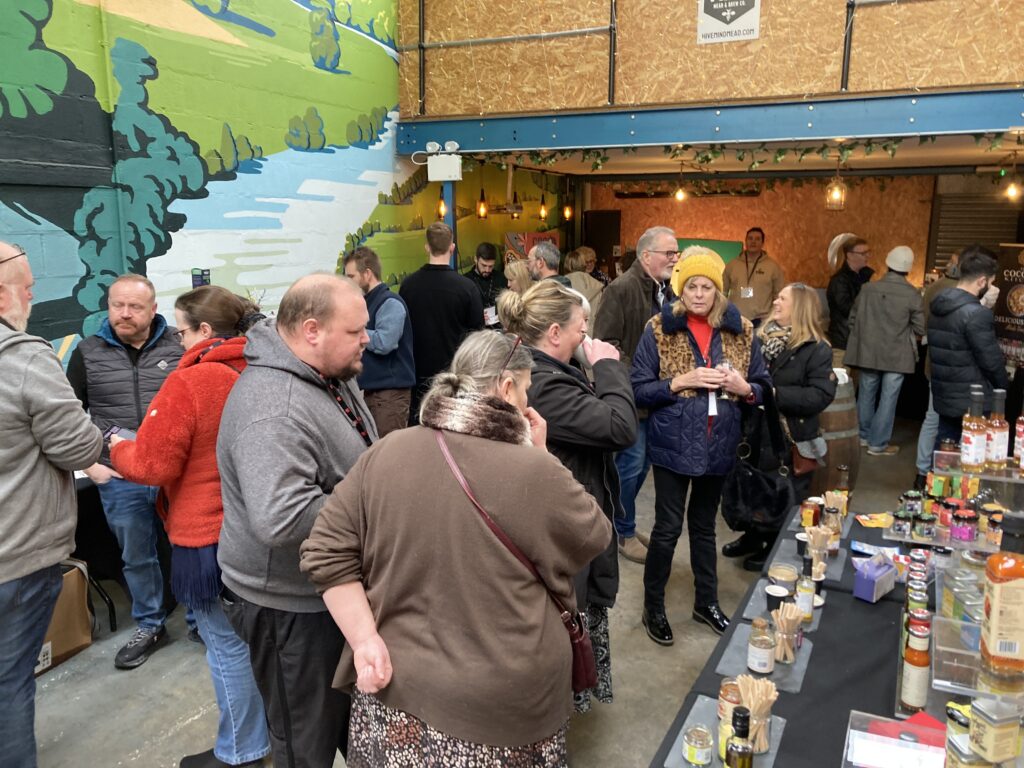
These three clusters - Fine Food, Honey, and Seafood - are perfect examples of the power of collaboration within the Welsh food and drink sector. By fostering connections, sharing knowledge, and tackling common challenges together, they’re not only helping individual businesses thrive but also strengthening the overall Welsh economy and enhancing the reputation of Welsh produce on a wider scale. This collaborative spirit is undoubtedly a recipe for continued success and a testament to the innovative and ambitious nature of the Welsh food and drink industry.
Interested in learning more or joining a cluster?
Email us: Finefoodanddrinkwalescluster@mentera.cymru | clwstwrmelcymru@mentera.cymru | Seafoodclusterwales@mentera.cymru









